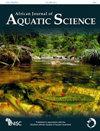Freshwater ecosystems and interactions with the SDG 2030 Agenda: implications for SDG implementation in South Africa
IF 1
4区 环境科学与生态学
Q3 MARINE & FRESHWATER BIOLOGY
引用次数: 2
Abstract
Freshwater ecosystems play a fundamental role in supporting the environment, the economy and people’s well-being. However, human development and mismanagement have degraded these ecosystems. Using network analysis, we examined the interlinkages (synergies and trade-offs) between indicator 6.6.1 (water-related ecosystems) and other Sustainable Development Goal (SDG) indicators related to freshwater ecosystems to support coherent policies and strategies for freshwater management. Research into scientific literature and reports on freshwater ecosystems and SDG indicator interlinkages was carried out in 2019 and 2020. Sustainable Development Goal custodians were also interviewed about indicator interlinkages and challenges, and the data analysed using thematic analysis. The results showed that water-related ecosystems had the highest positive interlinkages (synergies) with environmental goals, while more trade-offs were found between water-related ecosystems and social goals. Thematic analysis showed that Sustainable Development Goals (SDGs) should focus on partnerships, governance, and challenges regarding water-related ecosystems and SDG implementation. Our findings suggest that an integrated and sustainable freshwater management approach is necessary, one that is embedded within the nexus approach embodied by the United Nations 2030 Agenda for Sustainable Development.淡水生态系统及其与2030年可持续发展目标议程的相互作用:对南非实施可持续发展目标的影响
淡水生态系统在支持环境、经济和人民福祉方面发挥着根本作用。然而,人类发展和管理不善使这些生态系统退化。通过网络分析,我们研究了指标6.6.1(与水有关的生态系统)与其他与淡水生态系统有关的可持续发展目标指标之间的相互联系(协同作用和权衡),以支持淡水管理的连贯政策和战略。2019年和2020年对淡水生态系统和可持续发展目标指标相互联系的科学文献和报告进行了研究。还就指标之间的相互联系和挑战以及利用专题分析对数据进行分析的问题,约谈了可持续发展目标的保管人。结果表明,与水有关的生态系统与环境目标之间的积极联系(协同作用)最高,而与水有关生态系统与社会目标之间的权衡更多。专题分析表明,可持续发展目标应侧重于伙伴关系、治理以及与水相关的生态系统和可持续发展目标实施方面的挑战。我们的研究结果表明,综合和可持续的淡水管理方法是必要的,这种方法嵌入了《联合国2030年可持续发展议程》所体现的联系方法中。
本文章由计算机程序翻译,如有差异,请以英文原文为准。
求助全文
约1分钟内获得全文
求助全文
来源期刊

African Journal of Aquatic Science
MARINE & FRESHWATER BIOLOGY-
CiteScore
3.90
自引率
7.10%
发文量
31
审稿时长
>12 weeks
期刊介绍:
The African Journal of Aquatic Science is an international journal devoted to the study of the aquatic sciences, covering all African inland and estuarine waters. The Journal publishes peer-reviewed original scientific papers and short articles in all the aquatic science fields including limnology, hydrobiology, ecology, conservation, biomonitoring, management, water quality, ecotoxicology, biological interactions, physical properties and human impacts on African aquatic systems.
 求助内容:
求助内容: 应助结果提醒方式:
应助结果提醒方式:


